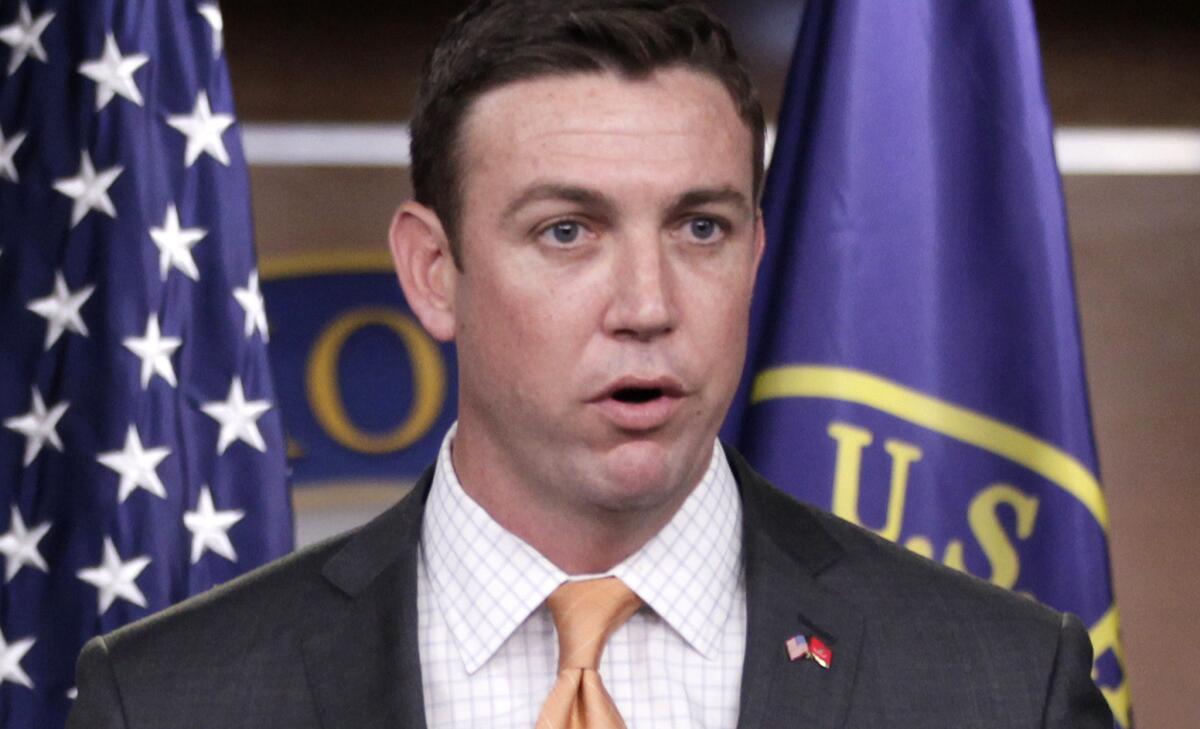Opinion: Pro-business Republicans link arms with House Dems to exhume Export-Import Bank

Rep. Duncan Hunter (R-Alpine) was one of more than 40 pro-business Republicans who joined with Democrats Friday to force a vote by the full House on a bill to reauthorize the Ex-Im Bank.
A day after a fringe group of Republican conservatives toppled House Speaker-in-Waiting Kevin McCarthy, a cadre of Main Street Republicans defied the leadership in a bid to resuscitate the Export-Import Bank.
Although no one actually said, “Right back atcha,” it had to be on the minds of some of the Republicans who joined the pro-Ex-Im effort. Many, if not all, of the more than 40 Republicans involved are McCarthy supporters, and killing Ex-Im has been a rallying point for the anti-McCarthy dissidents.
The bank operated for decades without controversy, providing billions of dollars worth of loan guarantees and other assistance to U.S. exporters. But in recent years, small-government conservatives aligned with the tea party have seized upon Ex-Im as an exemplar of crony capitalism.
This faction argues that federal taxpayers don’t need to be involved in the export credit business -- that risk, they say, is better left to the private sector. Measured in dollar terms, most of Ex-Im’s help goes to big-ticket items sold by giant U.S. businesses such as Boeing and General Electric, which the anti-Ex-Im forces argue don’t need the government’s assistance. Besides, many of the foreign customers whose purchases of U.S. goods are indirectly subsidized by Ex-Im -- for example, foreign airlines that buy planes from Boeing -- are companies that compete with U.S. businesses that don’t receive similar aid for their purchases.
Or so the argument goes. But like so much of what we hear from the tea party wing of the GOP, this purist view is divorced from reality.
Only a tiny percentage of the transactions aided by Ex-Im are big-ticket items from Fortune 50 exporters. The overwhelming majority of the loan guarantees are relatively small-dollar transactions for businesses that commercial banks simply don’t want to help. The transactions are too small in some cases; in others, the borrower is in a country that banks don’t really want to do export-credit business in.
Meanwhile, numerous countries around the world have their own version of Ex-Im, helping their businesses lower the cost of their exports to foreign buyers. When Ex-Im’s authorization expired at the end of June, the United States left its exporters to compete on a playing field that other countries were still tipping aggressively in their own direction.
That’s why so many businesses of all sizes have pressed Congress to revive Ex-Im. Some are so aggravated that they’ve gone further, canceling political fundraisers or, in GE’s case, moving workers to countries that still provide export credits.
Yes, the system favors those who are savvy enough to use it. But it’s not “crony capitalism” in the sense of political donors being put at the head of the line, or of guarantees being steered arbitrarily to favored recipients. As long as Ex-Im is within its federally imposed limits, any company that meets the published, objective criteria for help gets it.
Backers of the bank (including California Republican Duncan Hunter) have proposed a number of improvements, such as beefing up its efforts to measure and manage risk, to address some of the critics’ complaints. But anti-Ex-Im lawmakers seem more interested in the symbolism of the bank than the details of its operation. They want to kill it, not reform it.
Included in this group are several members of the House leadership, most notably Rep. Jeb Hensarling (R-Texas), chairman of the House committee that has jurisdiction over Ex-Im. To get around Hensarling and the GOP-controlled House Rules Committee, Ex-Im backers filed a discharge petition Friday to send an Ex-Im reauthorization bill by Rep. Stephen Lee Fincher (R-Tenn.) straight to the House floor. Within hours, 218 House members had signed the petition, which means the bill will have its vote within the next three weeks.
Granted, that won’t help Ex-Im in the Senate, where Majority Leader Mitch McConnell (R-Ky.) is on record in opposition. McConnell has promised Ex-Im supporters that they’ll be able to vote on its reauthorization, and they appear to have the majority in that chamber. On the other hand, Sen. Ted Cruz (R-Texas) and other opponents have pledged to fight to keep the Ex-Im down, and they’ll have the filibuster on their side.
At any rate, the House’s discharge petition could be a sign of things to come as pro-business Republicans look outside their caucus for ways to get things done.
Follow Healey’s intermittent Twitter feed: @jcahealey
More to Read
A cure for the common opinion
Get thought-provoking perspectives with our weekly newsletter.
You may occasionally receive promotional content from the Los Angeles Times.







